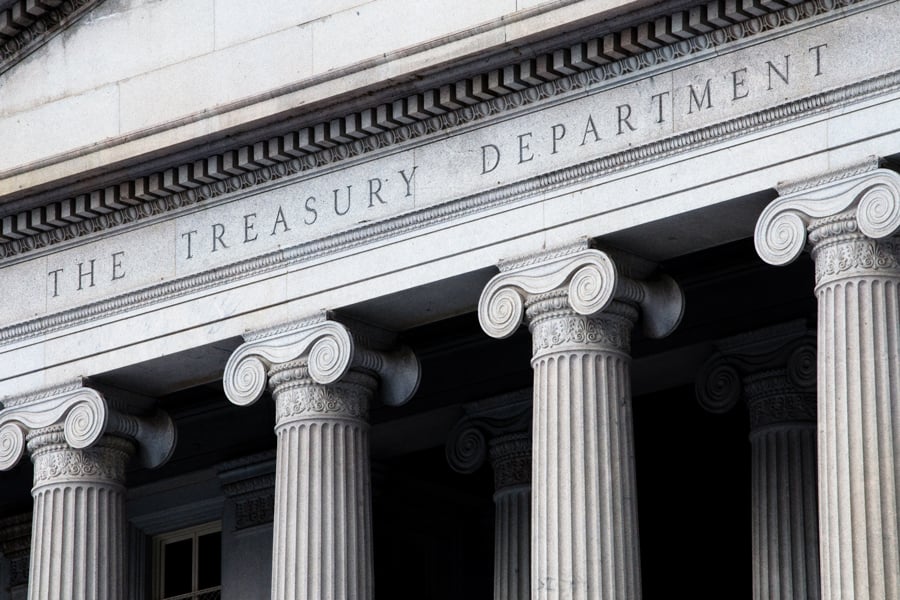

The shortage of Treasury bills is about to get a whole lot worse.
All along, Wall Street has been bracing for a record decline in second-quarter net issuance as the Treasury cuts supply in response to tax season and the Federal Reserve buys bills to boost reserves.
But now, supply is set to get squeezed even more as the COVID-19 scare causes demand for Treasuries to soar. Money-market funds in particular are rushing to lock in rates before they reach 0%, prompting strategists at JPMorgan Chase & Co. to say demand could outstrip supply by over $1 trillion next quarter.
“We made the case that scarcity was about less supply and Fed demand,” said Priya Misra, the global head of rates strategy at TD Securities. Now “we have to add the investor-demand component.”
The most immediate impact will be on savers, who can expect the minuscule yields they’re getting on money-market funds to keep shrinking. But analysts say the knock-on effects could extend well beyond that. They could spill into overnight lending markets and hamper the Fed’s ability to control its policy rate — just as the economic fallout from the coronavirus starts to emerge.
While Treasury Secretary Steven Mnuchin indicated Wednesday the U.S. may forgo seasonal cuts to bill issuance to fund a possible extension of the April 15 tax filing deadline, as of now, supply is still set to decline.
The first cuts, on Thursday, come as bills the Treasury issues for cash management purposes are due and last week’s bill auctions settle. That will reduce the net amount outstanding by roughly $42 billion.
Margaret Kerins, global head of fixed-income strategy at BMO Capital Markets, said the magnitude of the supply-demand imbalance will largely hinge on the money-market fund industry.
“The size of the flows into money-market funds and their subsequent demand for securities will be a key factor in how large the bill scarcity is,” she said.
Money-market funds that buy government securities attracted $53 billion in new money in the week ended March 4, according the Investment Company Institute, pushing total assets to a record $2.75 trillion.
Instead of putting the money to work in the market for overnight repurchase agreements to buy the highest-yielding securities, many fund managers like Federated Investment Management favor longer-dated bills because of the likelihood of more rate cuts by the Fed.
It makes more sense to buy a “one-year bill than buying a one-month and rolling it over,” said Federated chief investment officer Deborah Cunningham.
That kind of pullback from the repo market, where money-market funds typically lend out cash in return for yield, may have caused the overnight repo rate to rise above the Fed’s target range last week, both before and after the central bank lowered rates. That, in turn, prompted a surge of dealer demand for the New York Fed’s overnight repo operations, which on March 4 attracted the most bids since the backstop began in September.
Of course, there’s nothing to stop the Treasury from issuing more bills to address any potential scarcity. Some market watchers expect any fiscal package from the Trump administration to cushion the economy from the virus will be funded with bills, which may alleviate some of the shortage.
Others are wondering whether the Fed will tweak its bill buying program to include short-dated coupon securities, something the bank has avoided because it doesn’t want to appear to be engaging in quantitative easing, or QE. (Though given how little room it has for further cuts, some say the coronavirus fallout may force the Fed’s hand anyway.)
“It’s still probably best to continue with just bills because it’s the least messy way forward,” said Thomas Simons, a money-market economist at Jefferies. “It’s still probably true because adding coupons does add problems the Fed wants to avoid.”
Either way, short-term markets may not get any relief until the Treasury plans on issuing more bills again, possibly in the third quarter, according to Teresa Ho, a strategist at JPMorgan.
“There’s too much cash chasing too few assets,” she said.

Relationships are key to our business but advisors are often slow to engage in specific activities designed to foster them.

Whichever path you go down, act now while you're still in control.

Pro-bitcoin professionals, however, say the cryptocurrency has ushered in change.

“LPL has evolved significantly over the last decade and still wants to scale up,” says one industry executive.

Survey findings from the Nationwide Retirement Institute offers pearls of planning wisdom from 60- to 65-year-olds, as well as insights into concerns.
Streamline your outreach with Aidentified's AI-driven solutions
This season’s market volatility: Positioning for rate relief, income growth and the AI rebound
